This is an archive of information released in the past.
Disclaimer: It may contain broken links or outdated information. Some parts may not function in current web browsers.
*Visit https://humans-in-space.jaxa.jp/en/ for the latest information.

About Kibo
Experiment Logistics Module-Pressurized Section
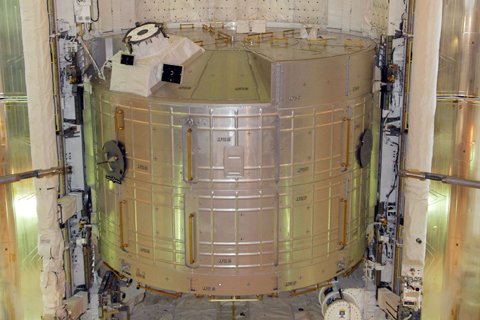
The ELM-PS being loaded into the space shuttle Endeavour's payload bay (Image credit: NASA)
Overview
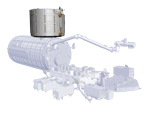
The Experiment Logistics Module-Pressurized Section (ELM-PS) is an on-orbit storage facility that provides stowage space for experiments, samples, and spare items. The crew can freely move between the ELM-PS and the Pressurized Module (PM).
The ELM-PS was launched aboard the space shuttle Endeavour on the STS-123 Mission (1J/A) on March 11, 2008. The ELM-PS traveled to the International Space Station (ISS) carrying a total of eight racks (five Kibo subsystem racks, two experiment racks, and one stowage rack), all of which were re-installed in the PM.
During the STS-123 Mission, the ELM-PS was attached to a temporary location, the zenith port of the Harmony module (Node 2), and then relocated to its final location, the zenith port of the PM on June 7, 2008, during the STS-124 Mission (1J).
| Item | Specification | |
|---|---|---|
| Shape | Cylindrical | |
| Diameter | Outer | 4.4m |
| Inner | 4.2m | |
| Length | 4.2m | |
| Mass | 4.2t (at launch: 8.4 tons) | |
| Number of Rack Locations | 8* all stowage rack locations (total) | |
| Power (provided from US segment) |
Max. 3kW 120V(Direct current) | |
| Environment | Temperature: 18.3 to 29.4℃ Humidity: 25 to 70% |
|
| Life time | More than 10 years | |
Structure
The ELM-PS is a cylindrical pressurized module.
Similar to the PM, the ELM-PS structural body is designed to bear loads imposed during the space shuttle's launch, ascent, and ISS attitude control and maneuvers. The ELM-PS is designed to protect the pressurized environment inside the module through an outer shell shielding consisting of aluminum alloy panels. A debris shield covers the ELM-PS's outer shell structure to protect the body from debris hits.
The ELM-PS is equipped with the following hardware;
Flight Releasable Grapple Fixture (FRGF)
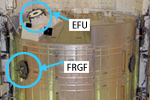
The FRGF is used when the shuttle's robotic arm or station's robotic arm grapples, moves, and relocates the ELM-PS.
Common Berthing Mechanism (CBM)
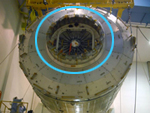
This is a Passive Common Berthing Mechanism (PCBM) used for berthing with the PM.
ELM-PS Exposed Facility Unit (EFU)
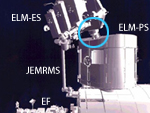
This mechanism accommodates Kibo's Experiment Logistics Module-Exposed Section (ELM-ES) while the H-II Transfer Vehicle (HTV) is berthed to the Exposed Facility (EF) to unload payloads or cargo delivered by the HTV Exposed Pallet (EP).
Trunnion
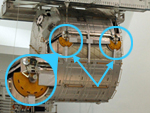
This is a fixing mechanism that holds a payload in the space shuttle's payload bay during the space shuttle's launch and ascent.
Internal Design
There are eight rack locations inside the ELM-PS. The Crew Support System provides onboard lighting and emergency lighting for the crew.
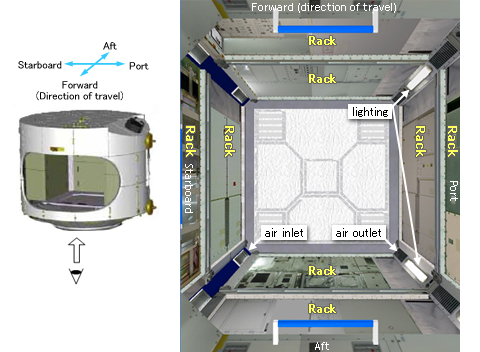
Image of right side is internal view of ELM-PS which is seen from PM
Current Status
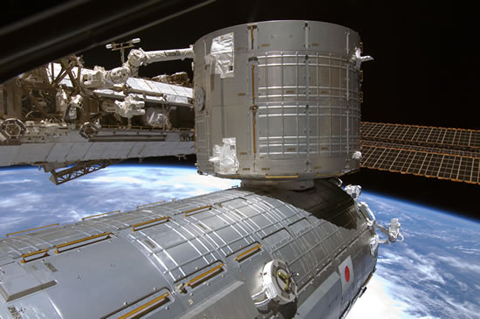
The ELM-PS which was relocated to the PM on the STS-124 Mission (Image credit: NASA)
The ELM-PS was launched aboard the space shuttle Endeavour on the STS-123 Mission on March 11, 2008. During the STS-123 Mission, the ELM-PS was attached to the Harmony module (Node 2).
The ELM-PS was relocated to the zenith side of the PM, its final position on June 7, 2008, during the STS-124 Mission.
| Copyright 2007 Japan Aerospace Exploration Agency | Site Policy |